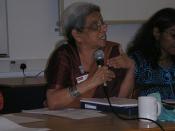Liberalism is the leading and background theory in contemporary political ideologies. As Bellamy states, twentieth-century liberalism has a broad area, from New Right conservatives to democratic socialists; it makes everyone seems a liberal. One of its major critics is communitarianism.
Communitarianism sees individuals as strongly linking in community, and their debates with liberalisms are basically founded in the contemporary liberal John Rawls's theory, and especially focus on his milestone book "A Theory of Justice". This book awakened a new look to political theory during 1970s and it continues. Most of liberalism's critics or defenders rely on Rawls's theories or related theories. In this article I prepare to introduce the both political philosophies and clarify some crucial debates from communitarianism to Rawls. Firstly, I like to make a brief introduction to contemporary liberalism, particularly on Rawls's theory of justice and his principle of justice. Secondly, I will illustrate communitarian's main ideas and their arguments with Rawls, which are the questions to Rawls's original position and individualism.
Finally, I will give my opinions to the debates and defend Rawls by following Rawls's contexts.
The Features of Contemporary Liberalism.
The characters of modern liberalism could not be specifically defined, but we can consult the fine explanation given by John Gray (1986, x):
It is individualist, in that it asserts the moral primacy of the person against the claims of any social collectivity; egalitarian, inasmuch as it confers on all men the same moral status and denies the relevance to legal or political order of differences in moral worth among human beings; universalist, affirming the moral unity of the human species and according a secondary importance to specific historic associations and cultural forms; and meliorist in its affirmation of the corrigibility and improvability of all social institutions and political arrangements.
No matter which extreme side of liberalism's area, modern liberalism insists and preserves the concepts of equality, liberty, rights, individuality and rationality. We can see it mostly mirrors the economic and social systems in modern Western Europe. It has been rooted in our daily life and became a dominant ideology. It does not entail people being or thinking the same but emphasizes the moral basis of equality of everyone, in their rights and duties. Also, following western individualism tradition, liberalism wishes the best achievement of everyone, that's the sense of positive freedom held by Hegel, freedom involves the chance for self-realization, liberty is not merely to act freely without impeding others. Contemporary liberals like Isaiah Berlin questioned the Hegelian conception of liberty; they hold that liberty is different from self-realization, since people have different kinds of life goal or self-realization, someone's final goal might be another one's obstacle, so it is hard to satisfy everyone's needs 'equally'. Furthermore, the other objections come from modern classical liberals. F. A. Hayek, for example, he asserts that the freedom to act is somewhat in conflict with the idea of equal freedom, for the property of power is initially meaning one side is stronger than the other side; it could not be distributed 'equally'.
Nowadays equality is no longer on political agenda, since we have noticed that people are born to be different by their natures, interests, talents or status. Also there are different demands between political and economic equality. Traditional liberals claimed in natural state, the strength of people are nearly equal so they come to an agreement to set a political authority to limit people's actions and rights, which produces a legitimate sovereignty. But it cannot explain the situation when people have unequal strength. Also, an impartial equality principle may be at odds in handling the issue of private properties. Some thinkers consider the unequal advantages or welfares produced by personal labor and be handed down to their next generations is truly just. It is still under debate.
As Phillips states (1999, ch. 1), Democracy movements do not run fast, the idea of political equality originated from seventeenth-century Europe, and female-voting right appeared just in the middle of twentieth-century. Late until 1940, the first non-racial elections just were held in South Africa. Lately, some thinkers also try to create a new look of political theories from the female point of view instead of the male dominated political theories in 1970s that generally ignore women issues. However, the shape of democracy today is not vague, we can identify features like the competitive election system, broad acceptance of all kinds of races, religions, cultures, genders, social levels, ages and opinions. These are all supported by liberalism, and liberals tend to accept a pluralistic society, which encourages each one to manage their life freely.
The general concept of equality of liberalism indicates everyone has the same right at a starting-point, and sharing the same opportunity to develop his or her talents. Therefore a welfare state or organization should confer the demanded resources. But everyone's needs may conflict, so people need a framework of rules to follow. Even under the restrictions of community or government, people are still entitled to acquire an extensive liberty, and by human nature, people have their economic and spiritual needs to pursue, also they should retain their individuality as much as possible so the society can be flexible.
And, as rationalists, liberals insist all the opinions of the public domain should be examined publicly. Since there are so many principles involved in liberalism, there seems no one most important leading idea that can be used as a criterion of social agreements. Hence, Rawls in his A Theory of Justice establishes such a first virtue, justice.


